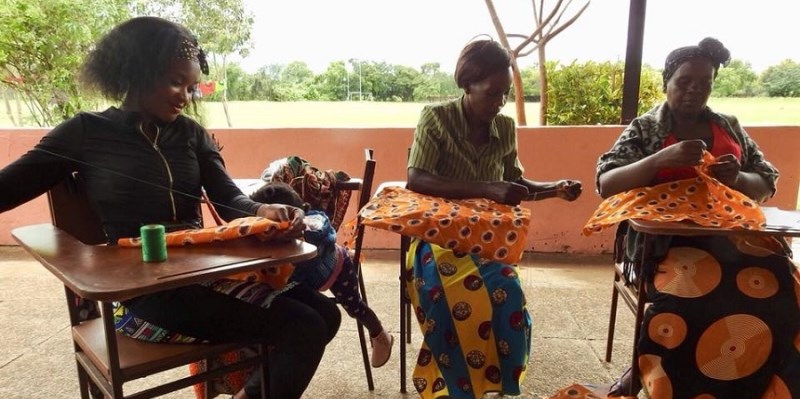Adult Literacy Club Zambia
Onderwijsproject van African Impact erkend door het Ministerie van Onderwijs in Zambia
Het Ministerie van Onderwijs in Zambia erkent officieel de onderwijsprojecten van African Impact. En dat is een prachtige opsteker voor de projectleiders van de projecten in Zambia én de enthousiaste vrijwilligers die dagelijks meehelpen om mooie resultaten neer te zetten. Weer een bevestiging van wat we al lang weten: vrijwilligerswerk doen help de lokale mensen écht! Lees hieronder het hoe en waarom:
“When you as a parent show interest in learning, your children will follow suit. You will be able to help them with homework from school”
Meet Dorothy Nzala, a mother of two who has been married for 31 years. She is a part of African Impact’s Women’s Group and Adult Literacy Club. After two years of attending our Adult Literacy Club and Women’s Group she knows how to speak and write in English. This is a stark contrast to how much English she knew prior to attending these groups. This is because Dorothy was unable to finish school. She stopped attending after completing grade 7 because her father failed to pay her school fees. Dorothy hasn’t let her lack of education stop her, as she uses what she learns in our programs to teach children bible study in Sunday School. One of her favorite memory’s is when her oldest daughter finished grade 12.

There are currently 750 million adults in the world who still cannot read and write. This year’s National Literacy month was centered on “‘Literacy and skills development’. It focused on skills and competencies required for employment, careers, and livelihoods, particularly technical and vocational skills, along with transferable skills and digital skills.
In Zambia, celebrations occurred on the national and provincial level. All thirteen districts of the Southern Province were present and they displayed information on their attempts to increase literacy rates in their area.
It was Livingstone who was awarded the recognition for their work to eradicate illiteracy – with African Impact highlighted for their contribution with educating the community with their Adult Literacy Classes. Dorothy’s achievements in particular were recognized when she was asked by the Ministry of Education to talk at the literacy month event here in Livingstone.
“I am proud to be in Women’s Group and proud that I have learned English,” said Dorothy.
“The literacy program has opened my eyes…I didn’t know how to read nor write but, today, I know how to read, write and speak a bit of English. I am able to sign for myself on important documents. If, in future, I get an opportunity to visit overseas, when it’s time to get a passport, I will be able to sign for myself. I therefore urge all the women and men gathered here, young or old, to join these literacy classes, they are very helpful,” she added.
Increasing literacy rates in Zambia has been a constant issue. English is the official language of Zambia but there are over 72 native languages with 7 of them nationally recognized. Billboards, newspapers, road signs and items in the grocery store are all in English but comprehension of the language is very low.
Recently, the government tried to improve literacy with a policy called the National Literacy Framework. The goal was to promote teaching in the local language, with students in grades one to four, between the ages of 7 and 13, to be taught in their local languages instead of in English.
The government’s policy has had varying effects, depending on which area of Zambia you focus on. According to “Henry Tukombe, permanent secretary for the Ministry of General Education, [he stated that] Zambia’s Education for All 2015 National Review, shows that overall literacy and numeracy rates in the country have improved. Teacher-student interactions are contributing to the improvements, he says.”
In adults – those above 15 years old – literacy is the most troubling in Zambia. Illiteracy rates went from 32.8% – or 3.2 million adults – in 2004, to 13.07% (1.9 million adults) in 2014. These numbers showed great improvement in the Ministry of Education’s overall goal of “achieving a 50 per cent improvement in levels of adult literacy by 2015.” This would then allow the community to assist children with their homework, decrease the amount of people living in poverty and overall provide more support for their families.
“When you as a parent show interest in learning, your children will follow suit. You will be able to help them with homework from school,” Dorothy said. For her, one of her proudest achievements is that her understanding of English allowed her to support her children in learning and completing education.
As part of the UN sustainable goals, which is “a call for action by all countries – poor, rich and middle-income – to promote prosperity while protecting the planet,” African Impact’s Adult literacy classes tie in with Goal number 4 – quality education. A quality education is fundamental to the well-being of a community to succeed and we strive to provide a quality education to the people of Livingstone through our programs.
